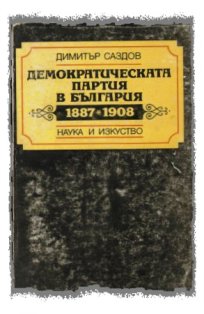
DEMOCRATIC PARTY IN BULGARIA 1887-1906
Author: Dimitar Sazdov
Editor's Note: See the provisional organization chart on Political Parties and Government Policies in "I. Stoyanov. Liberal Party in the Principality of Bulgaria 1879-1886. Sofia, 1989".

Liberal-Democrats in Bulgaria
Stoyan Danev
Stoyan Petrov Danev (28 January 1858 - 30 July 1949) is a Bulgarian lawyer and politician, longtime leader of the Progressive Liberal Party (Progresivnoliberalna). He was Prime Minister of Bulgaria in the 23rd, 24th, 25th (1901-1903) and 33rd (1913 ) government. He was Chairman of V Grand National Assembly (1911) and the XV Ordinary National Assembly (1911-1913).
Stoyan Danev studied in Shumen and Prague. In 1876 participated as a volunteer in the detachment of Philip Totyo during the Serbo-Turkish War. He studied law in Zurich and Leipzig and graduated at Heidelberg in 1881. In 1883 studied Political Sciences in Paris.
After returning to Bulgaria he became a clerk in the Ministry of Finance and from 1884 was a lawyer in Sofia. From 1894 to 1898 he taught international law at the High School. Ongoing member of the Progressive Liberal Party, he became its leader after the withdrawal of Dragan Tsankov in 1897.
In early 1901 Stoyan Danev was included in the government of Petko Karavelov, a coalition with the Democratic Party, and from 1901 to 1903 headed the three separate governments of the Progressive Liberal Party. During this period was signed a Bulgarian-Russian military convention (1902).
In the coalition government with the People’s Party (1911-1913 ) Stoyan Danev was chairman of the National Assembly and performed some missions. He was a delegate at the signing of the armistice in Chataldia in 1912 and led the Bulgarian delegation which signed the London peace treaty (1913). On the eve of the Balkan War, he again headed the government for a short time.
In the coming years Stoyan Danev teaches diplomatic history at the Free Universitv (1916-1934). After World War I, he participated in coalition governments of Teodor Todorov and Alexander Stamboliyski (1918-1920). In 1922, as well as other leaders of the opposition, was arrested by the Stamboliyski's agricultural government. He was released only after the 9 June 1923 coup d'etat. From 1924 to 1939, Prof. Stoyan Danev acted as chairman of the Bulgarian Red Cross. Stoyan Danev was a member of the Court of Arbitration in The Hague.
Stoyan Danev was married to Rada Burmov (1868-1952), and have three sons and one daughter. In 1914 the family settled in newly built house on the street "Vrabcha" № 7 in Sofia, which is nowadays a municipal museum.
Vasil Radoslavov
Vasil Hristov Radoslavov (15 July 1854 - 21 October 1929) is a Bulgarian politician, headed the Liberal Party (Radoslavists) from 1887 to 1918. He was twice prime minister of Bulgaria - after the abdication of Prince Alexander I in 1886, and during the First World War (1913-1918).
Vasil Radoslavov was born in Lovech in the family of Hristo Popovich (cell teacher in Lovech). He studied in his native town of Lovech and the Aprilov's School, Gabrovo. Llater he moved in Pisek (1872) and Prague (1874), Czech Republic. From September 1877 to July 1878 he was Secretary of Lovech city council.
Since the autumn of 1878 Radoslavov studied Law in Vienna and graduated in Heidelberg, Germany, in 1882. After returning to Bulgaria as a lawyer and he is engaged in political activity. Active member of the Liberal Party. In 1884 he became a regular member of the Bulgarian Literary Society, now the Bulgarian Academy of Sciences. He was Justice Minister in the second government of Petko Karavelov (1884-1886 ) and on 18 December 1885 “without consultation” with the government introduces Judicial laws of the Principality of Bulgaria in Eastern Rumelia, which causes a diplomatic row.
In the coming months Radoslavov is among the most active representatives of the nationalist wing of the Liberal Party. It conflicts with Prime Minister Karavelov and several times threatened to leave the Cabinet, which took place in July 1886. After the coup of August 1886 and the abdication of Prince Alexander I, Radoslavov heads the government and became the youngest prime minister in the history of Bulgaria. After the election of Prince Ferdinand I, Vasil Radoslavov's wing adopted the name Liberal Party (Radoslavists), and became legal opposition to the government of Stefan Stambolov (1887-1894).
After the fall of the government of Stambolov in 1894, the Liberal Party (Radoslavists) participated briefly in the government of Konstantin Stoilov, but soon again went into opposition. Vasil Radoslavov was Interior Minister in the governments of both Dimitar Grekov and Todor Ivanchov (1899-1900). He led counter-insurgency against the introduction of tithing in Durankulak, Shabla and Trustenik. So in 1903, he was sentenced to eight months imprisonment by the first state court for violating the Constitution. He was later pardoned.
After the defeat of Bulgaria in the Balkan Wars (1913) Vasil Radoslavov headed the Liberal coalition government. It remained in power until 1918 and ruled the country during the First World War. Although the inclusion of Bulgaria in the war was meeting relatively widespread support, after its end many blamed for the failure and the second national catastrophe the Government of Radoslavov.
After the conclusion of the Thessaloniki truce on 29 September 1918, Vasil Radoslavov went to Germany. In 1923, he was convicted by the third state court in absentia to life imprisonment for government policies during the First World War. In the summer of 1929 Radoslavov got amnesty. He died in Berlin on 21 October that year. On 3 November, he was buried with honors in Sofia.
Vasil Radoslavov was married to Evanthia Radoslavova.
Picture 1: Sample illustration on the text above.
|
(i). Stoyan Danev and Vasil Radoslavov — "irreconcilable" liberal-democrats from the upper-middle class bourgeoisie, staunch city civilians and anti-agrarians.
|
Copyright © 2010 by the author.